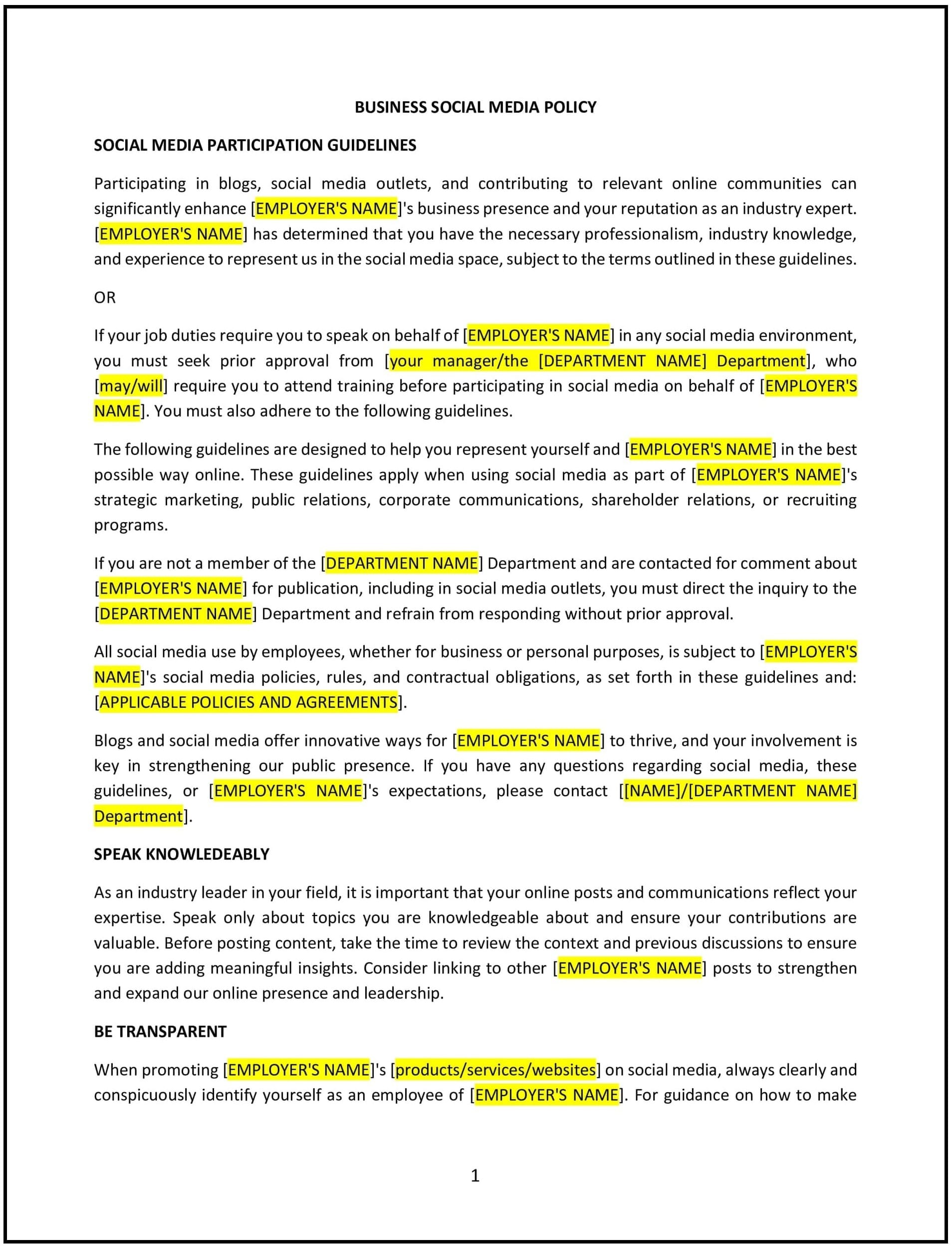Got contracts to review? While you're here for policies, let Cobrief make contract review effortless—start your free review now.

Customize this template for free
Business social media policy (Ohio)
A business social media policy establishes guidelines for how Ohio businesses expect employees to use social media, both in the workplace and outside of work, in relation to the company. This policy outlines acceptable behavior on social media platforms, including what employees can and cannot post, how they should represent the company online, and the importance of maintaining a professional image. It also addresses how businesses handle social media use during work hours and the repercussions for misusing social media in a way that could negatively affect the company’s reputation.
By implementing this policy, Ohio businesses can ensure that employees understand their responsibilities regarding social media use, promote a positive company image, and mitigate potential risks associated with online activity.
How to use this business social media policy (Ohio)
- Define acceptable use of social media: The policy should clearly specify the acceptable use of social media for both work and personal purposes, including the guidelines for sharing content related to the company and interactions with clients, customers, and colleagues online.
- Address work-related social media use: Specify whether employees are allowed to use social media during work hours for business-related purposes, such as marketing, client engagement, or professional networking. The policy should establish how work-related social media should be handled and the limits on personal use during business hours.
- Set expectations for personal social media accounts: The policy should guide how employees should conduct themselves on personal social media accounts in relation to the company. It may include restrictions on posting confidential company information, criticizing the business, or engaging in controversial discussions that could harm the business’s reputation.
- Establish rules for confidentiality: Employees should be reminded not to share confidential business information or proprietary company data on their personal social media accounts. The policy should define what constitutes confidential information and the consequences of disclosing it publicly.
- Protect the company’s reputation: Clearly outline that employees should avoid posting content that could be considered offensive, discriminatory, or inappropriate. The policy should set boundaries around behavior that could negatively impact the company’s image, even if the content is shared on personal accounts.
- Address monitoring of social media: The policy should clarify whether the business monitors employees’ social media activity, especially when it comes to business-related posts. While respecting privacy, the business should maintain transparency about its right to monitor public social media activity.
- Include guidelines for the company’s official social media accounts: The policy should establish who is authorized to post on behalf of the company and how business-related social media interactions should be conducted. It should also set expectations for tone, professionalism, and consistency across social media platforms.
- Ensure compliance with Ohio state and federal laws: The policy should comply with Ohio state laws and federal regulations, including those regarding free speech, privacy, and discrimination. Businesses should ensure they are respecting employees’ rights while maintaining a professional online presence.
- Review and update regularly: Periodically review and update the policy to reflect changes in social media platforms, emerging risks, and shifts in Ohio state laws or federal regulations.
Benefits of using this business social media policy (Ohio)
This policy provides several key benefits for Ohio businesses:
- Protects the company’s reputation: By setting clear boundaries for social media use, businesses reduce the risk of employees inadvertently damaging the company’s reputation through inappropriate or controversial posts.
- Encourages professionalism: The policy helps employees understand how to represent themselves and the business online, fostering a professional image both in and outside of the workplace.
- Reduces legal risks: Clear guidelines about confidentiality and acceptable online conduct help businesses avoid potential legal risks, such as lawsuits related to defamation, discrimination, or breaches of confidentiality.
- Promotes positive employee behavior: Employees are more likely to act responsibly online when they understand the expectations and guidelines set forth by the business. This can improve employee morale and engagement.
- Supports consistent branding: The policy ensures that social media content related to the business maintains consistency in tone and messaging, reinforcing the company’s brand and public image.
- Enhances employee privacy protection: By providing clear guidelines on personal social media use, the policy can help protect employees' privacy while ensuring they understand the boundaries between personal and professional online activity.
- Ensures compliance with laws: The policy helps businesses comply with Ohio state laws, federal regulations, and industry standards regarding social media use, privacy, and online conduct.
Tips for using this business social media policy (Ohio)
- Communicate the policy clearly: Ensure that all employees understand the policy by including it in the employee handbook, discussing it during onboarding, and offering refresher training as necessary.
- Be transparent about monitoring: Let employees know if the business monitors social media activity or has access to their public posts, especially in relation to business-related content.
- Encourage respectful online behavior: Reinforce that employees should represent the business in a respectful and professional manner, whether they are posting on work-related accounts or personal social media profiles.
- Stay updated on social media trends: Social media platforms and online behaviors change frequently. Regularly review and update the policy to stay aligned with current trends and the evolving needs of the business.
- Provide clear reporting procedures: If an employee notices social media content that could harm the company’s reputation, provide a clear process for reporting these issues, including designated contacts and guidelines for handling negative online content.
- Support employees’ freedom of expression: Balance the company’s need to protect its reputation with respect for employees’ right to express themselves. The policy should avoid being overly restrictive while ensuring that employees understand the boundaries regarding business-related content.
- Regularly review the policy: Periodically review the policy to ensure it remains relevant, particularly as new social media platforms emerge and as social media risks evolve.